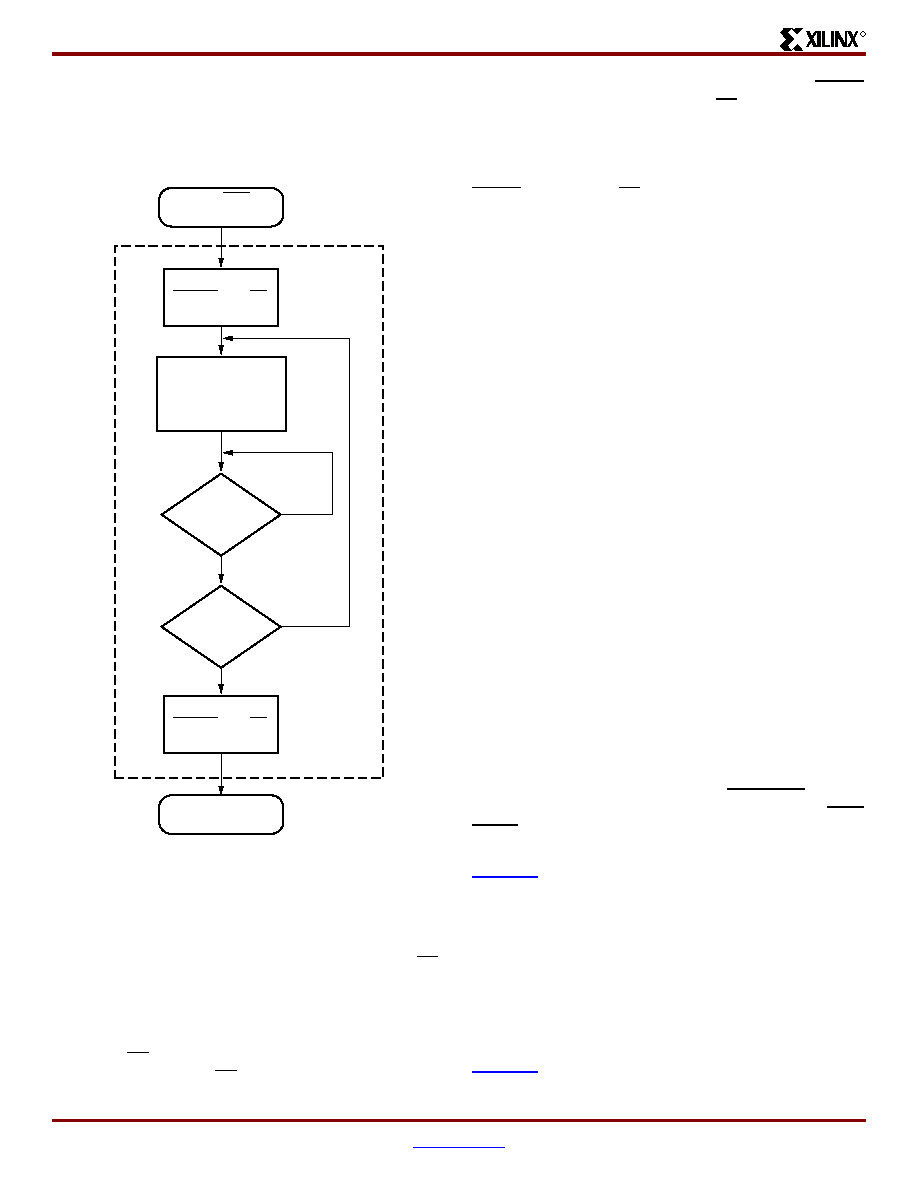- 您現(xiàn)在的位置:買賣IC網(wǎng) > PDF目錄4292 > XC2S50E-6FTG256C (Xilinx Inc)IC SPARTAN-IIE FPGA 50K 256FTBGA PDF資料下載
參數(shù)資料
| 型號(hào): | XC2S50E-6FTG256C |
| 廠商: | Xilinx Inc |
| 文件頁(yè)數(shù): | 30/108頁(yè) |
| 文件大小: | 0K |
| 描述: | IC SPARTAN-IIE FPGA 50K 256FTBGA |
| 產(chǎn)品變化通告: | FPGA Family Discontinuation 18/Apr/2011 |
| 標(biāo)準(zhǔn)包裝: | 90 |
| 系列: | Spartan®-IIE |
| LAB/CLB數(shù): | 384 |
| 邏輯元件/單元數(shù): | 1728 |
| RAM 位總計(jì): | 32768 |
| 輸入/輸出數(shù): | 182 |
| 門數(shù): | 50000 |
| 電源電壓: | 1.71 V ~ 1.89 V |
| 安裝類型: | 表面貼裝 |
| 工作溫度: | 0°C ~ 85°C |
| 封裝/外殼: | 256-LBGA |
| 供應(yīng)商設(shè)備封裝: | 256-FTBGA |
| 其它名稱: | 122-1328 |
第1頁(yè)第2頁(yè)第3頁(yè)第4頁(yè)第5頁(yè)第6頁(yè)第7頁(yè)第8頁(yè)第9頁(yè)第10頁(yè)第11頁(yè)第12頁(yè)第13頁(yè)第14頁(yè)第15頁(yè)第16頁(yè)第17頁(yè)第18頁(yè)第19頁(yè)第20頁(yè)第21頁(yè)第22頁(yè)第23頁(yè)第24頁(yè)第25頁(yè)第26頁(yè)第27頁(yè)第28頁(yè)第29頁(yè)當(dāng)前第30頁(yè)第31頁(yè)第32頁(yè)第33頁(yè)第34頁(yè)第35頁(yè)第36頁(yè)第37頁(yè)第38頁(yè)第39頁(yè)第40頁(yè)第41頁(yè)第42頁(yè)第43頁(yè)第44頁(yè)第45頁(yè)第46頁(yè)第47頁(yè)第48頁(yè)第49頁(yè)第50頁(yè)第51頁(yè)第52頁(yè)第53頁(yè)第54頁(yè)第55頁(yè)第56頁(yè)第57頁(yè)第58頁(yè)第59頁(yè)第60頁(yè)第61頁(yè)第62頁(yè)第63頁(yè)第64頁(yè)第65頁(yè)第66頁(yè)第67頁(yè)第68頁(yè)第69頁(yè)第70頁(yè)第71頁(yè)第72頁(yè)第73頁(yè)第74頁(yè)第75頁(yè)第76頁(yè)第77頁(yè)第78頁(yè)第79頁(yè)第80頁(yè)第81頁(yè)第82頁(yè)第83頁(yè)第84頁(yè)第85頁(yè)第86頁(yè)第87頁(yè)第88頁(yè)第89頁(yè)第90頁(yè)第91頁(yè)第92頁(yè)第93頁(yè)第94頁(yè)第95頁(yè)第96頁(yè)第97頁(yè)第98頁(yè)第99頁(yè)第100頁(yè)第101頁(yè)第102頁(yè)第103頁(yè)第104頁(yè)第105頁(yè)第106頁(yè)第107頁(yè)第108頁(yè)

28
DS077-2 (v3.0) August 9, 2013
Product Specification
Spartan-IIE FPGA Family: Functional Description
R
— OBSOLETE — OBSOLETE — OBSOLETE — OBSOLETE —
If CCLK is slower than FCCNH, the FPGA will never assert
BUSY. In this case, the above handshake is unnecessary,
and data can simply be entered into the FPGA every CCLK
cycle.
A configuration packet does not have to be written in one
continuous stretch, rather it can be split into many write
sequences. Each sequence would involve assertion of CS.
In applications where multiple clock cycles may be required
to access the configuration data before each byte can be
loaded into the Slave Parallel interface, a new byte of data
may not be ready for each consecutive CCLK edge. In such
a case the CS signal may be deasserted until the next byte
is valid on D0-D7. While CS is High, the Slave Parallel inter-
face does not expect any data and ignores all CCLK transi-
tions. However, to avoid aborting configuration, WRITE
must continue to be asserted while CS is asserted during
CCLK transitions.
Abort
To abort configuration during a write sequence, deassert
WRITE while holding CS Low. The abort operation is initi-
ated at the rising edge of CCLK. The device will remain
BUSY until the aborted operation is complete. After aborting
configuration, data is assumed to be unaligned to word
boundaries and the FPGA requires a new synchronization
word prior to accepting any new packets.
Boundary-Scan Configuration Mode
In the boundary-scan mode, no nondedicated pins are
required, configuration being done entirely through the
IEEE 1149.1 Test Access Port (TAP).
Configuration through the TAP uses the special CFG_IN
instruction. This instruction allows data input on TDI to be
converted into data packets for the internal configuration
bus.
The following steps are required to configure the FPGA
through the boundary-scan port.
1.
Load the CFG_IN instruction into the boundary-scan
instruction register (IR)
2.
Enter the Shift-DR (SDR) state
3.
Shift a standard configuration bitstream into TDI
4.
Return to Run-Test-Idle (RTI)
5.
Load the JSTART instruction into IR
6.
Enter the SDR state
7.
Clock TCK (if selected) through the startup sequence
(the length is programmable)
8.
Return to RTI
Configuration and readback via the TAP is always available.
The boundary-scan mode simply locks out the other modes.
The boundary-scan mode is selected by a <10x> on the
mode pins (M0, M1, M2). Note that the PROGRAM pin must
be pulled High prior to reconfiguration. A Low on the PRO-
GRAM pin resets the TAP controller and no boundary scan
operations can be performed. See Xilinx Application Note
XAPP188 for more information on boundary-scan configu-
ration.
Readback
The configuration data stored in the Spartan-IIE FPGA con-
figuration memory can be read back for verification. Along
with the configuration data it is possible to read back the
contents of all flip-flops/latches, LUT RAMs, and block
RAMs. This capability is used for real-time debugging.
For more detailed information see Xilinx Application Note
XAPP176, Configuration and Readback of the Spartan-II
and Spartan-IIE FPGA Families.
Figure 21: Loading Configuration Data for the Slave
Parallel Mode
Yes
No
FPGA
Driving BUSY
High?
After INIT
Goes High
Load One
Configuration
Byte on Next
CCLK Rising Edge
To CRC Check
DS001_19_032300
No
End of
Configuration
Data File?
Yes
User Drives
WRITE and CS
Low
User Drives
WRITE and CS
High
相關(guān)PDF資料 |
PDF描述 |
|---|---|
| XC2S100-5PQ208C | IC FPGA 2.5V 600 CLB'S 208-PQFP |
| XC3S250E-4TQ144I | IC FPGA SPARTAN 3E 144TQFP |
| XC3S250E-5TQG144C | IC FPGA SPARTAN-3E 250K 144-TQFP |
| 34VL02T/ST | IC EEPROM 2KBIT 400KHZ 8TSSOP |
| XC3S250E-5CPG132C | IC FPGA SPARTAN-3E 250K 132CSBGA |
相關(guān)代理商/技術(shù)參數(shù) |
參數(shù)描述 |
|---|---|
| XC2S50E-6FTG256I | 功能描述:IC SPARTAN-IIE FPGA 50K 256FTBGA RoHS:是 類別:集成電路 (IC) >> 嵌入式 - FPGA(現(xiàn)場(chǎng)可編程門陣列) 系列:Spartan®-IIE 標(biāo)準(zhǔn)包裝:40 系列:Spartan® 6 LX LAB/CLB數(shù):3411 邏輯元件/單元數(shù):43661 RAM 位總計(jì):2138112 輸入/輸出數(shù):358 門數(shù):- 電源電壓:1.14 V ~ 1.26 V 安裝類型:表面貼裝 工作溫度:-40°C ~ 100°C 封裝/外殼:676-BGA 供應(yīng)商設(shè)備封裝:676-FBGA(27x27) |
| XC2S50E-6PQ208C | 功能描述:IC FPGA 1.8V 384 CLB'S 208-PQFP RoHS:否 類別:集成電路 (IC) >> 嵌入式 - FPGA(現(xiàn)場(chǎng)可編程門陣列) 系列:Spartan®-IIE 標(biāo)準(zhǔn)包裝:40 系列:Spartan® 6 LX LAB/CLB數(shù):3411 邏輯元件/單元數(shù):43661 RAM 位總計(jì):2138112 輸入/輸出數(shù):358 門數(shù):- 電源電壓:1.14 V ~ 1.26 V 安裝類型:表面貼裝 工作溫度:-40°C ~ 100°C 封裝/外殼:676-BGA 供應(yīng)商設(shè)備封裝:676-FBGA(27x27) |
| XC2S50E-6PQ208I | 制造商:Xilinx 功能描述:IC SPARTAN-IIE FPGA 50K 208-PQFP 制造商:Xilinx 功能描述:IC FPGA 146 I/O 208PQFP |
| XC2S50E-6PQG208C | 功能描述:IC SPARTAN-IIE FPGA 50K 208-PQFP RoHS:是 類別:集成電路 (IC) >> 嵌入式 - FPGA(現(xiàn)場(chǎng)可編程門陣列) 系列:Spartan®-IIE 標(biāo)準(zhǔn)包裝:24 系列:ECP2 LAB/CLB數(shù):1500 邏輯元件/單元數(shù):12000 RAM 位總計(jì):226304 輸入/輸出數(shù):131 門數(shù):- 電源電壓:1.14 V ~ 1.26 V 安裝類型:表面貼裝 工作溫度:0°C ~ 85°C 封裝/外殼:208-BFQFP 供應(yīng)商設(shè)備封裝:208-PQFP(28x28) |
| XC2S50E-6PQG208I | 制造商:XILINX 制造商全稱:XILINX 功能描述:Spartan-IIE FPGA |
發(fā)布緊急采購(gòu),3分鐘左右您將得到回復(fù)。